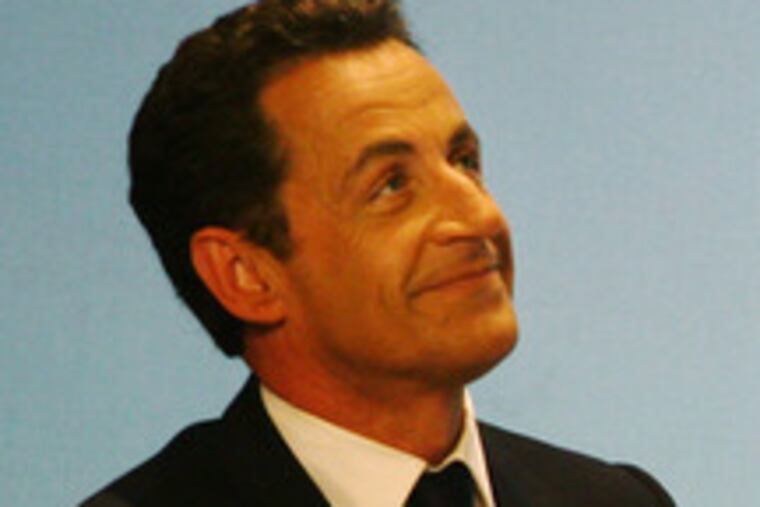French elect Sarkozy, a U.S. ally
The next president spoke warmly of the United States - but also asserted French independence.

PARIS - Nicolas Sarkozy, an immigrant's son promising to revitalize France, won a comfortable victory yesterday in a presidential election seen as a mandate for his bold plans to enact free-market reforms, reassert French influence abroad, and strengthen ties to the United States.
Center-right candidate Sarkozy won 53 percent of the vote to beat Socialist Segolene Royal, who aspired to be France's first female president, according to official results based on 95 percent of the vote. Turnout for the runoff election was about 85 percent, 2 percentage points shy of the record.
"The French people have expressed themselves," Sarkozy told a boisterous crowd in a theater near the Avenue Champs Elysees. "They have chosen to break with the ideas, the habits and the behaviors of the past. I want to rehabilitate work, authority, morality, respect, merit. I want to restore the honor of the nation and the national identity. I want to return to the French the pride of being French."
The election was a historic moment for a country anxious about economic stagnation, political malaise and ethnic tension. The solid victory showed that voters believe Sarkozy has the strength and vision to push through challenging reforms such as streamlining government, encouraging entrepreneurship and cutting taxes, analysts said.
"This is the first time that the right incarnates change more than the left," said Thierry Vedel, an analyst at the Center for the Study of French Political Life here.
Sarkozy's vocal admiration for the United States distinguishes him from a political class with an anti-American streak. During his victory speech, Sarkozy drew cheers when he spoke warmly of the United States - and when he vowed that France would preserve its independence.
"I want to send word to our American friends to tell them they can count on our friendship, which has been forged by the tragedies of history that we have confronted together," Sarkozy said. "I want to tell them that France will always be at their side when they need her. But I also want to tell them that friendship is accepting that friends can think differently, and that a great nation like the United States should not be an obstacle to the fight against global warming, but on the contrary should take the lead because the future of all humanity is at stake."
President Bush, who had a strained relationship with Jacques Chirac, called Sarkozy soon after the result was announced and congratulated him, officials said. In addition to transatlantic issues, Sarkozy wants to restore France as a driving force in a European Union plagued by division and dysfunction.
Sarkozy, 52, represents a new generation of leaders taking the helm after three decades of politics dominated by two men: Chirac, 74, and his predecessor, Socialist Francois Mitterrand.
Sarkozy's win changes the face of the presidency and could bring new diversity to the elite as well. He is the son and grandson of Hungarian and Greek-Jewish immigrants. As interior minister and as a candidate, he took on the thorny issue of integrating the mostly immigrant and Muslim population in bleak public housing projects that have been the scene of prolonged riots, proposing affirmative action and a "Marshall Plan" to create jobs.
Sarkozy reached out to his opponents last night, promising to unite the nation. He is expected to name a government that will prominently feature minorities, women and members of other parties when he takes office May 16, Vedel said.
"He likes to surprise, and I think he will take very strong, very symbolic actions to demonstrate change," Vedel said.